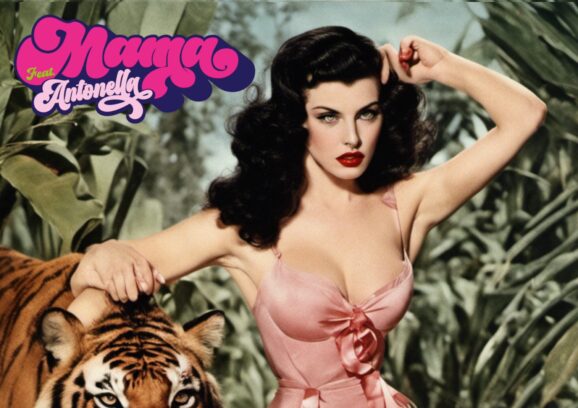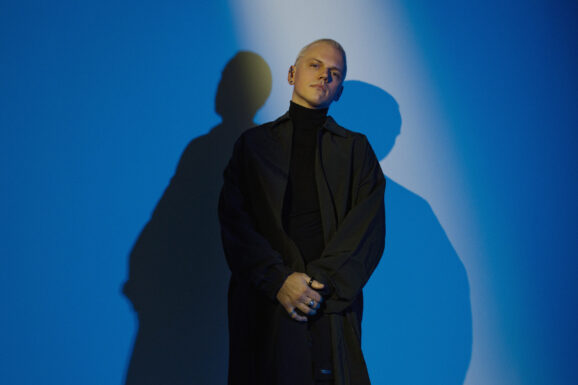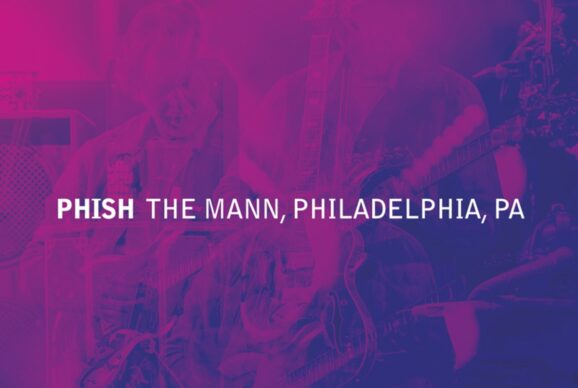In the world of rock and roll, it’s hard to find a busier artist than Ambrose Kenny-Smith. His day job, if you will, is multi-instrumentalist with Melbourne, Australia’s psych gods King Gizzard & the Lizard Wizard. The group is unrivaled in both their studio output (over 20 albums in a decade with five of those coming out in 2022 alone) and tour schedule, which often includes three-hour “marathon” shows. Needless to say, King Gizzard should be a full time investment for Kenny-Smith, and yet somehow he has also managed to front The Murlocs along with band mate Cook Craig along with Cal Shortal on guitar, Tim Karmouche on keyboards, and Matt Blach on drums. Compared to the frenetic experimentation of King Gizzard, The Murlocs fall into more of a garage-rock and soul blues sound that is anchored by Kenny-Smith’s powerful, wailing vocals and driving harmonica. Impressively, The Murlocs have managed to release six albums all while some of their members split time between King Gizzard and other projects. Just this past September, they released Rapscallion, and now Kenny-Smith and the gang are back already with Calm Ya Farm, due out May 19th on ATO (PRE-ORDER).
Compared to the blistering psych-soul of Rapscallion, Calm Ya Farm finds The Murlocs taking their sound in more of a cosmic country direction, though don’t expect a full-on country record as it very much carries that Murlocs stamp. Bursting with boogie woogie piano, sunny, twangified guitar and big vibrant harmonies, the album feels like a throwback to the boisterous country-inflected rock and roll of the 70s. Kenny-Smith sings with his usual sense of abandon, letting his free-flowing vocals and hard-charging harmonica give the album a walloping, forceful sound that is also a damn good time. Though Kenny-Smith is happy to take on the front man role with The Murlocs, Calm Ya Farm finds the band making a truly collaborative album that feels expansive in the way they use an array of instruments and styles to conjure up a tight yet wild collection of rock and roll tunes. It also marks yet another progression of sound for a band that, while not as prolific and fanatically followed as King Gizzard, has maintained a trajectory that would be considered impressive by the standards of most bands.
With Calm Ya Farm as well as King Gizzard’s first of what we can only hope will be several releases this year – with an almost comically long title of PetroDragonic Apocalypse; or, Dawn of Eternal Night: An Annihilation of Planet Earth and the Beginning of Merciless Damnation – both on the way, I spoke with Kenny-Smith about the collaborative spirit of the album, the concept he was going for, balancing his workload while staying creative and more.
There seems to be a distinctly 70s cosmic country rock sound on Calm Ya Farm. What kind of albums were you listening to as you went into the production?
Since we did Bittersweet Demons, I’ve been trying to get the guys and myself to write a bit more conceptually and make an album that’s more seamless from start to finish. I think everyone sort of gets stuck in their usual ways of songwriting. I think I always wanted to do a country record, like me and [guitarist Cal Shortal] listen to a bunch of country records, so it was always in the back of our minds, like we could do that. But we don’t always have much time because King Gizzard is like a constant full time job. I try to keep The Murlocs guys pumping along so that’s why I’ve been pushing them to all write a lot more over the years. I guess my easiest tool is to write lyrics and help arrange. They’re all very good at writing the music and stuff themselves, so I was like, let’s go down this country route and see how it goes. In true Murlocs form, it kind of just came out sounding more like us as well. No one really dove too hard into it sounding like Willie Nelson or anything. Cook Craig dove into it pretty hard and fast at the start – I think he has like five of six songs that he wrote on the album. He kind of led the charge, like “Common Sense Civility” was like the first one that was brought to the table. Then everyone started sending in ideas around to go for that sort of vibe. I guess the biggest initial influence for me that I had sent to the other guys as a reference was Exile On Main Street by the Rolling Stones because that’s like my all-time favorite record. I was like, I want to do something like this and I reckon we really could if we put our minds to it. It was also in a time when we had finished Rapscallion and we were all stuck in lockdowns and twiddling our thumbs, so we just decided to start working on another record. These two records are sort of like from that period. I’m pretty keen get back in a room together – obviously Exile On Main Street is such a live sounding vibing record – that we couldn’t really quite nail it in that aspect. We were like recording claps around the room and I was throwing chairs and kicking over tables trying to make it sound like some things happening.
It’s interesting you mention the Exile On Main Street influence on this album because I saw you say somewhere that you were going for a sound that was a bit more clean. I think of that album as just raucous, so how did that clean approach shake out in the final sound?
I guess it was trying not to add too many layers, but then it got clustered with too many like it always does. I guess that was just an initial thought and seeing it where it ended up. Like doing a cleaner harmonica tone, but then later in post-production I just added more distortion. I tried not to scream too much, I think I sing less like a cat in the bag than normal and not as screechy. The idea was there but then it just shaped into sounding like The Murlocs. For the next thing we do, I want to just go all out, make it really heavy and rocking. Sort of like “Bellarine Ballerina” did on Rapscallion. But I also need it go up and down, I can’t just be constantly head banging the whole time.
Was the approach for this album different than any of the previous ones? You can hear a ton of different instruments on this one.
There’s a lot of honky tonk-piano-esque parts to it, there’s piano on almost every song. I encouraged Cal the guitarist to add as much slide as he could. I recorded all my harmonica open mike, I didn’t amplify it once. This was a challenge because I’m obsessed with Chicago blues harmonica and I always amp up and use a bullet. I decided to make it more open harmony and to do stuff with my hands more so it sounded a bit more country-ish, but then naturally we just added more distortion to it. So it definitely didn’t end up sounding like some pop country record, but in The Murlocs I think I’m too much of an old soul with the classic rock stuff and I always want to make that stuff at the end of the day. That’s the music I like and I don’t really care, if people like it that’s great.
Your harmonica is a cornerstone of The Murlocs sound. Why do you think there isn’t more harmonica in rock these days?
I feel like not everyone likes the harmonica. It can be a bit intrusive and piercing and irritable depending on who’s playing. It’s been something I’ve messed around with since I was a kid. I think it’s about crafting a nice tone and once you get that going it doesn’t matter what you play, the simpler the better. In King Gizzard we always have arguments – I’ve always just wanted it to sound like a rhythm guitar and be another added layer that never needed to be on top – but before we got our own front of house, the mixer would always just put it on top of everything because everyone regards it as a solo instrument. So I’ve always been fighting for it to be more of a rhythmic thing, but as I get older I realize it’s still a solo thing that needs to come in [sometimes] and not be always there. I definitely tried to push that down a few throats for a while but now I have realized that it either has its place or it doesn’t depending on the music. I also think it’s not on a lot of music these days because no one really wants to mess with it unless you’re well aware of what it can do, and there’s not even enough guitar music going around for it to find its place.
Was there a harmonica eureka moment for you that sent you down this path?
My dad plays harmonica and sings and stuff. When I was younger it seemed like everyone played guitar and keys and everything else and no one was playing the harmonica really, so I just grew to it. I think it was my father as well playing a lot of Chicago blues music and African-American blues music. It engrained in me so heavily and I was so obsessed to the point where I was just falling asleep every night listening to those records and I would play along by ear. I don’t know how to play any songs on harmonica, I just know what key to play and I’ll play the key the other person is in. I’m definitely not trained with it or with anything that I do, it’s all just by ear and winging it until it sounds decent.
Judging from The Murlocs and King Gizzard catalogues, you seem to be a big fan of cohesive concept albums. What’s the attraction to making albums like that for you?
I think the creative enjoyment, just being able to chop and change, to make things exciting, scary and dangerous territories. I always think of the [David] Bowie quote when your toes are barely touching the deep end is when you’re on the cusp of making something exciting or whatever. You’re just happy in general when you’re not trying to rehash what you’ve done before.
At this point do you think the fans are pretty much open to wherever you want to take them?
Yeah I think so. I think with King Gizzard we’re going to lose and gain fans as we go along depending on what we do, but that’s why I like having The Murlocs as well. Like if I’m not fully invested in something we’re doing, I can still use The Murlocs to get my rocks off in making music that’s close to my heart. The Murlocs is always somewhat seamless and straightforward, which sort of resets and refreshes my mind into figuring out ways that I can then go back and contribute to King Gizzard. Like I can go get things off my chest and then go back to King Gizzard and be like, I know what to contribute.
A lot of bands take the approach of spacing out albums, which seems to be the opposite strategy with both of your bands. Have The Murlocs or King Gizzard ever discussed a strategy or approach here or is it just that you have to let it all out?
Neither of them have ever been controlled by a big label. We’ve always just called the shots ourselves and built the fanbase by doing that and releasing whatever we want. Years ago, Stu [Mackenzie] in King Gizzard was like, I want to play in a country band, a metal band and do this and that, and then he just realized he can do all of that with King Gizzard and do whatever he wants whenever he wants. It’s sort of like going against the grain, and we were surrounded by a lot of our friends bands that would get pigeonholed and crumble under the pressure trying to make that first album. I guess we just never really wanted that burden and that’s why I’ve started taking that approach to The Murlocs as the years have gone by. If it does well that’s even better.
Does it make for a challenge to prepare for a tour when you pretty always have a whole slew of new tunes to play for the fans?
Yeah. I don’t think I’m the smartest person in the world so I have a very small capacity of what I can do in life, so if the band was ever to break up, I think I would just be lost with where to put all of those hundreds of songs stuck in my head. I feel like I always need to be learning and remembering and practicing and burning our songs into my brain so it just comes without thinking about it. That comes with touring a lot. With the Murlocs, we did that tour back in November and it was what we really needed. I’m glad it was for Rapscallion because those songs are fun to play live. When I got up to perform it just came out. I think that’s what my brain has trained itself to do from being in King Gizzard. Today after I finish this interview I have to go rehearse, and we’re rehearsing like 2-3 days a week for the next month until we go to the United States. We’re going to try and learn a couple records’ worth of material that we haven’t played live yet. I’m worried that one day I’ll start getting dementia or something from just overload of material, but until that day comes, onwards and upwards.
I was reading an interview where you were talking about playing with The Murlocs and then going right into the King Gizzard three-hour set at Red Rocks. How do you even keep the creative mindset and motivation to pull that off?
With The Murlocs I’m singing and performing and trying to channel a connection with people in the crowd, and it sort of just sends me into a zone that when I walk off I can’t really like string a sentence together or have much of a social interaction. For that first hour after walking offstage I’m just like a shell of a human. For that show I pretty much went backstage and did like a headstand to try and get as much blood back to my head as possible for doing that three-hour marathon with King Gizzard. After that was finished, the guys in Gizz and everyone else were partying and letting loose and I was just completely utterly decked, I couldn’t even look at a beer. I went straight to my bunk and passed out until everyone staggered on a few hours later. It definitely takes it out of me doing Murlocs, and King Gizzard takes it out of me in a different way. That’s why I love them both, because I get to have everything off my chest in both worlds.
Any U.S. tour dates for The Murlocs in the coming year?
I’m a bit worried with everything going on. It went from King Gizzard planning the following year to now planning the year after that, like almost two years ahead. And after last year with coming back from COVID and booking myself to the absolute brim and pushing myself to tour that much, I’ve just burnt myself out a bit at the moment. That’s why I am pushing to get this album out now, so King Gizzard can do this Europe tour and then I’m hoping I’m allowed to get most of next year off so I can focus on resting and doing The Murlocs. So hopefully the next time we come back to the States we’ll have yet another album, which will hopefully be our best live sounding album. I don’t know, I say one thing at the start of a year and then overbook myself into oblivion.
So in general there are no plans to slow it down for the moment?
I highly doubt it. Not with King Gizzard, that’s just a constant fast-moving train. It’s a hard time to ask me a question like that when we’re releasing a single each week and working on albums and rehearsing. Can’t complain, I love what I do and I’m super grateful. I’m looking forward to performing all this material that The Murlocs have now.
Can we expect another burst of King Gizzard albums at some point this year?
Probably. I don’t know what I’m allowed to give away or not anymore. I keep my mouth shut and then Stu goes on Twitter and blurts it all out, so who knows. As you know and as you can expect, we have a few things in the pipeline. That’s why I was like, better take this window of opportunity to get the Calm Ya Farm out now before it turns into Gizz world.










